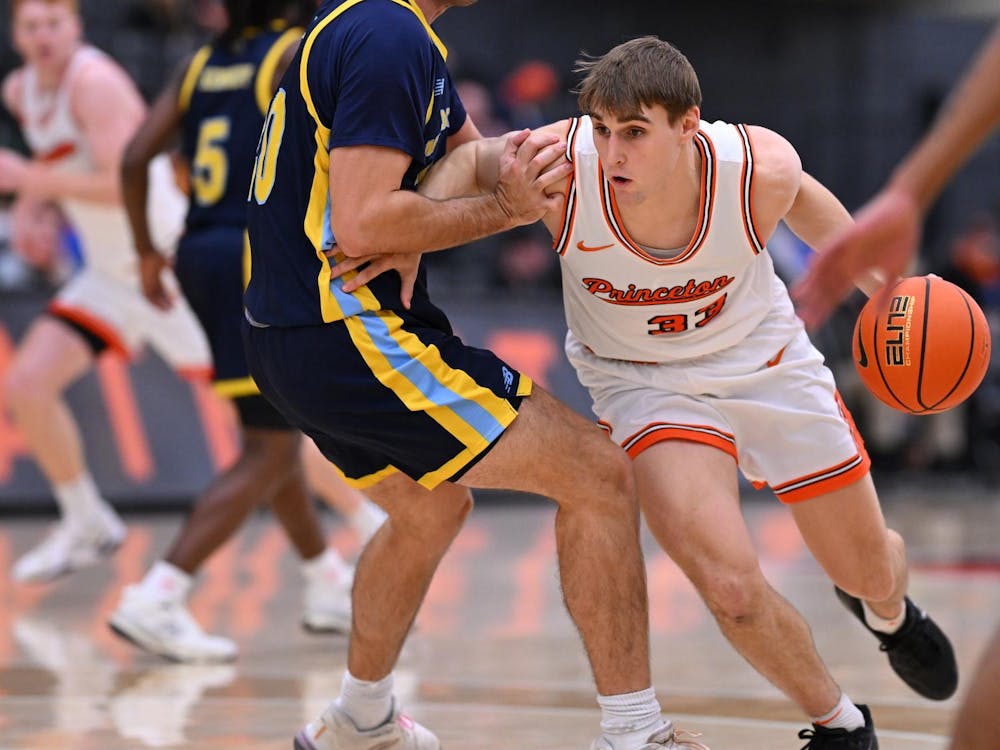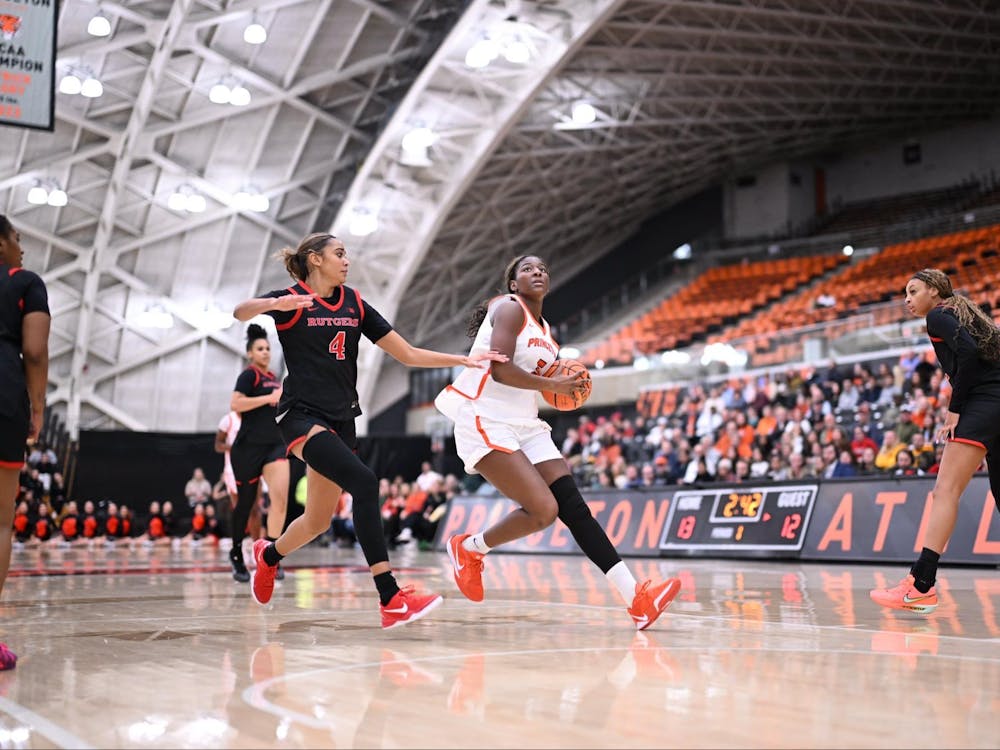Nobody in the room expected that the man sitting to their left would also not return to the program.
Yet that is exactly what happened: Head coach Sydney Johnson ’97 accepted the head coaching job at Fairfield University on Monday in a move that shocked many around the college basketball world.
Johnson had become the embodiment of Princeton basketball, a former Ivy League Player of the Year who came back to turn the program around from its deepest depths. In his first season, the Tigers went 6-23 — their worst record ever — but, slowly, the team improved. In his second season, Princeton snapped Cornell’s 19-game conference-winning streak with a 61-41 thrashing at Jadwin Gymnasium. In the third, the Tigers won their first five league games, finished with 22 victories and reached the semifinals of the College Basketball Invitational.
All that, of course, set up the historic 2010-11 season. Princeton, the preseason favorite, opened play with an overtime victory over in-state rival Rutgers, setting the tone for a year that would feature 14 games decided by five points or fewer in overtime. A 65-61 home win over Harvard gave the Tigers the early edge in the conference standings, but Harvard returned the favor at Lavietes Pavilion, kicking off the most thrilling Ivy League stretch run in years.
And Johnson was at the center of it all. He created some of the most powerful images of the team’s March run, forcing his team to sit on the bench and watch Harvard celebrate its first share of the Ivy League title, uncharacteristically yelling at his players to spark a second-half comeback at Penn and walking around the court with restrained joy as students rushed the court after junior guard Doug Davis’ buzzer-beating jumper gave Princeton a 63-62 playoff victory.
Most memorably, Johnson broke down in tears during the final press conference of the season, a moment captured and replayed by cameras across the nation.
After Davis’ shot sent the Tigers to the NCAA Tournament, Johnson told ESPN’s Jeremy Schaap on camera, “I love, love, love Princeton basketball.”
His departure does not necessarily make this statement any less true, but it certainly paints those words in a different context. Students, alumni and fans talked about the coach in glowing terms, daring to bring up the hallowed name of Pete Carril, thinking that perhaps Johnson could be the next legendary leader who remained a Tiger for generations.

But as the tournament progressed and Princeton’s offseason got underway, rumors began to surface. One tweet was easy to dismiss; a second, spotting him on Fairfield’s campus, more difficult to ignore. Reports linked him to Towson, his hometown school, and even Bradley. To most fans, Johnson seemed a likely candidate to follow in the steps of Northwestern coach Bill Carmody and Georgetown’s John Thompson III ’88 and be snapped up by a power-conference program, not someone who would leave his alma mater for another mid-major school.
Information remained sparse throughout the weekend, and Johnson’s departure still seemed unlikely until the news broke at 5 p.m. Monday, surprising Orange and Black supporters everywhere.
“I wasn’t surprised at all to hear that other universities wanted him after what he was able to do in four years at Princeton. I was, however, a little surprised that he left because it meant so much to him to bring Princeton back to the top of the Ivy League and he worked very hard to make that happen,” former captain Nick Lake ’10 said in an email.
Though the initial reaction on campus was that Johnson was taking a step backward, Princeton and Fairfield are very similar schools from a strictly basketball standpoint. The Ivy League and the Metro Atlantic Athletic Conference have proven to be roughly on par with each other — both in quality of play and in providing opportunities to move up the coaching ladder — and Fairfield won the MAAC regular-season championship, reached the second round of the National Invitational Tournament and will return most of its key players.

What remains unanswered, however, is why Johnson would make a lateral move away from his alma mater.
Some chalked the move up to the increasingly competitive nature of coaching in college athletics.
“If anybody follows Division I basketball and football, one can never be surprised that a coach might be considering other options,” Director of Athletics Gary Walters ’67 said in a phone conversation on Tuesday afternoon.
“Coaching is just a lot more competitive now, and a lot of programs are trying to win,” former captain Marcus Schroeder ’10 said. “The job security in coaching isn’t great at all. I think when there’s another opportunity that presents itself, coaches are going to make their decision on where to go.”
Yet Johnson’s move is more or less unprecedented in the Ivy League, at least in recent times.
Since 1980, 17 of 38 Ivy League head coaches left their program after four years or fewer, not counting the seven that are currently active. In most cases, however, the departure was easily explained. Six left to lead major-conference programs, seven finished with a losing record in each of their final two seasons and Cornell’s Scott Thompson left for health reasons.
That leaves only two winning coaches who left an Ivy League school for another mid-major program. Neither had nearly as much success as Johnson did in either of his final two years — both led teams that finished barely above .500 — and more than 20 years has passed since both left.
Johnson himself has been notably quiet, as he had not spoken to any member of the press about the move as of Tuesday evening. His reasons for leaving have been left up to speculation.
It is hard to imagine Johnson reaching a higher peak at Princeton than last year’s thrilling season. A stacked Harvard squad with every player returning will be the clear favorite to win the league next season, and without two of the team’s top players in Mavraides and Maddox, the Tigers may take a step back. Additionally, the Crimson looks to be a powerhouse for several years down the road: Harvard has allegedly altered its admissions standards for basketball recruits in ways that Princeton will not.
The most frequently discussed reason for Johnson’s departure, however, is simply money. Though neither school publicly releases data for coaching salaries, rumors indicate that Fairfield offered as much as double Johnson’s current pay. Fairfield spent $1.95 million on men’s basketball in 2009-10 while Princeton spent only $815,000, according to data provided in compliance with the Equity in Athletics Disclosure Act, making it likely that the Stags offered a significantly better package.
Walters declined to comment on Johnson’s salary, citing institutional policy to keep contractual matters private.
Over the past three decades, the average term of an Ivy League coach has been 6.7 seasons, with a median of five years, yet each of Princeton’s last four coaches has not outlasted his first freshman class.
The first three moves made sense at the time; Carmody moved up to Northwestern, Thompson went home to Georgetown and Joe Scott ’87 was bound to leave after turning a defending Ivy League champion into a team that went 2-12 in the conference in three short years. Still, the recent discontinuity is striking in contrast to Carril’s reign, which lasted 29 years.
Walters, the point guard on the 1965 NCAA Final Four team, said he was not particularly concerned with the amount of turnover.
“I want to maintain the overall quality of our basketball program over a period of time,” he said. “One thing I’m proud of, as a director of athletics, is that I have taken chances on three coaches who have been assistants — Bill Carmody, John Thompson and Sydney Johnson — and I’m pleased that all three have been able to perform well at Princeton and have been able to advance their careers in the way that they wanted to advance them.”
Walters said he is in the process of “identifying a national pool of candidates” to fill the head coaching vacancy. Possible alumni targets include assistant coach Brian Earl ’99, Georgetown assistant coach Mike Brennan ’94 and Northwestern assistant Mitch Henderson ’98.







